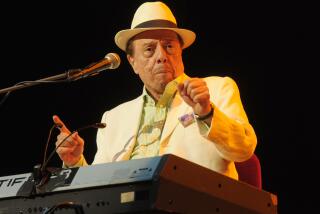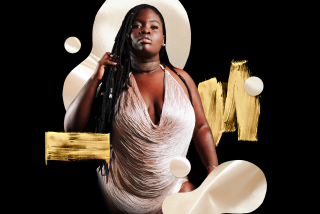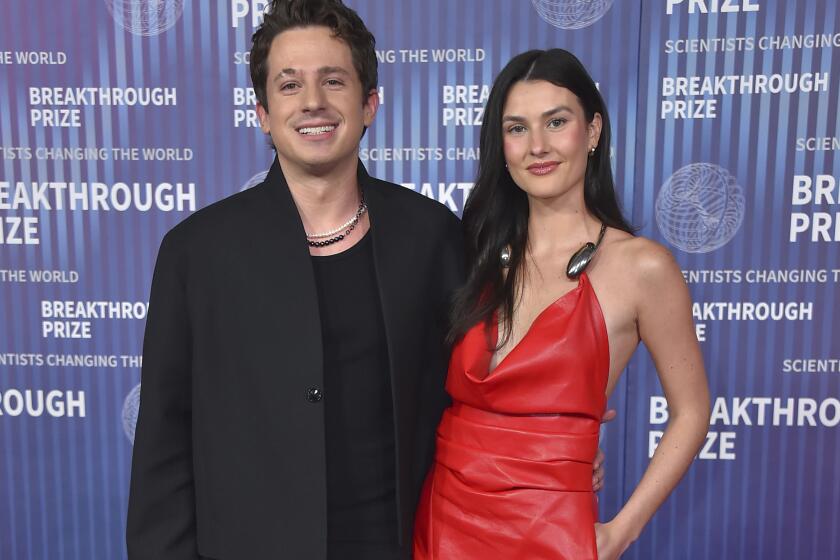Singer-composer Luciana Souza channels Chet Baker

The dreamy, androgynous voice first caught Luciana Souza’s attention many years ago. She admired the singer’s dead-center pitch, his laid-back phrasing, his imperturbable California cool while giving voice to fiery emotions.
But Souza, a Grammy-nominated singer-composer who has worked in classical, pop and jazz, heard something else in that voice: a vulnerability that was exceedingly rare among male singers of the ‘50s and ‘60s, a condition of all-consuming yearning and unguarded fragility that native Brazilians like Souza call by its untranslatable Portuguese name: saudade.
“And that’s what I love about it,” Souza said, “because to me it reveals his honesty. That’s what I’m interested in when I listen to music, musicians, any composer, anything. It’s, ‘What’s the humanity behind this thing that you built?’”
PHOTOS: Celebrity portraits by The Times
Aficionados of West Coast jazz will hardly be surprised to learn that the singer who caught Souza’s ear long ago was Chet Baker, the heroin-addled genius, boy-faced trumpeter-singer who briefly blazed across the pop music firmament before fireballing into self-destruction in 1988.
The so-called James Dean of jazz, Baker lived fast, died relatively young (58) and left a problematic legacy that has been the subject of biographies, photo books and Bruce Weber’s haunting documentary film “Let’s Get Lost.”
What may surprise Baker fans are the discoveries that Souza teases out on her exquisitely sensitive, infinitely languorous new album, “The Book of Chet,” released last month on the Sunnyside label.
PHOTOS: Hollywood back lot moments
As if that weren’t enough grist for any musical interpreter to chew on, this fall she also has put out a third album of duets, “Duos III,” a record of lesser-known (by North Americans) Brazilian classics like “As Rosas Não Falam” by the great samba vocalist Angenor de Oliveira, a.k.a. Cartola.
Souza thinks of the two records, one in English, one in Brazilian Portuguese, as the A and B sides of the same disc.
“I coexist within this thing of Brazil and U.S.,” she said. “It’s very easy for me, once you understand the language, or you feel you can communicate in a language, and you understand what people are saying, and you’re not hiding anything or afraid of anything.”
Curling herself into a sofa in her modernist Venice home not long ago, the culturally and linguistically ambidextrous Souza, who was born in São Paulo but has lived in the United States for two decades, spoke about Baker and the simpatico affinities that yielded both West Coast cool jazz and the Brazilian bossa nova of Tom Jobim and João Gilberto.
“I think there was a similarity and a harmony happening, and the synchronicity of what was happening in California, and what was happening or about to happen in Rio de Janeiro with bossa nova,” she said. “We didn’t have a cool, young new sound in Brazil in those days. There was rock in the U.S., but I think Brazilian youth at the time needed a sound for themselves. It was so cool at the time to carry around an acoustic guitar and sit down and play those beautiful chords.”
Souza said that Baker — born and raised in small-town Oklahoma, moved to L.A. after serving in the Army and earned his bona fides playing with Vido Musso and Stan Getz — helped midwife bossa into being when Brazilians such as Jobim, Gilberto and Astrud Gilberto started listening to Baker and Getz records.
PHOTOS: Celebrity portraits by The Times
“Those people were listening to Chet as they were making the music,” she said.
Produced by Souza’s husband, musician Larry Klein, and backed by the trio of guitarist Larry Koonse, bass player David Piltch and drummer-percussionist Jay Bellerose, “The Book of Chet” takes pains to present Baker in a fresh light, free of preconceptions.
“Larry and I just started listening to a lot of records,” Souza said. “And so we came up with maybe 40, 50 songs, and of course there were the obvious ones like ‘My Funny Valentine,’ ‘Time After Time,’ and then we started just scratching those without even talking about it.”
Eventually, they assembled an overview of standards that Baker imbued with his relentless introspection, including “The Thrill Is Gone”; the Rodgers-Hart “He Was Too Good to Me”; Ray Noble’s “The Touch of Your Lips” and “The Very Thought of You.” They cap the 10-song disc with “You Go to My Head,” the Haven Gillespie-Fred Coots tune that perhaps sums up Baker’s addictive relationship to life (“And I find you spinning ‘round in my brain/ Like the bubbles in a glass of champagne”).
“When I read about him I can see that he’s the one clearly who’s looking for something that it’s not there,” Souza said. “There’s deep sadness that I find in his music, which reveals to me something about the man and about men in general. Not men as male and female, but humankind. And I’m interested in that, in people who can do that. And I think he had no choice once he’s taking drugs. He’s in an altered state anyway and unable to contain it.”
Whatever traces of melancholy tinge her new record, none of it has rubbed off on Souza, the daughter of a musician father and a mother who sang and wrote poetry.
An ebullient personality and warmly intelligent presence, now in her mid-40s, Souza has carved out an unusual niche for her music since arriving in the United States at 18 to study jazz composition at the prestigious Berklee College of Music in Boston. She later pursued a master’s at the New England Conservatory, focusing on composition, and spent several years teaching in Brazil.
But eventually the United States drew her back, and she has lived here ever since, the last six years in Los Angeles.
“I’m still Brazilian and can’t deny it and don’t want to,” she said. “But I think forming yourself as an adult, having a child here, all this just makes me feel so American.”
Sergio Mielniczenko, a native Brazilian who hosts the program “Global Village Fridays” on L.A. radio station KPFK (90.7 FM), said Souza has displayed “amazing taste” and sophistication in picking projects that include a disc of Pablo Neruda poems, a much-praised solo performance on “The Passion of San Marcos” by the Argentine classical composer Osvaldo Golijov, and collaborations with Herbie Hancock, Paul Simon and other top-shelf pop artists.
“She lives two worlds,” Mielniczenko said. “That’s a privilege, actually, to be able to keep your soul as a Brazilian and be able to experience and taste and delve into another world. When I think of Luciana I think she’s able to bring the highest level of musicianship that we can achieve.”
So what could a person of such privilege connect to in Baker’s ravaged, beautiful voice?
Souza laughed.
“I have had, I wouldn’t say tragedy, but sadness,” she said. “I had a marriage before, for 15 years, I have had events that have happened. I lost both my mother and father to cancer a few years back.”
She paused. “I’m interested in [experiencing] both ways and being intimate with that as well. Not that I want to sit down and be depressed and feel sad. But I want to be able to dance through these two worlds.”
PHOTOS AND MORE:
PHOTOS: Iconic rock guitars and their owners
LISTEN: James Bond songs by British artists
PHOTOS: Unfortunately timed pop meltdowns
More to Read
The biggest entertainment stories
Get our big stories about Hollywood, film, television, music, arts, culture and more right in your inbox as soon as they publish.
You may occasionally receive promotional content from the Los Angeles Times.











